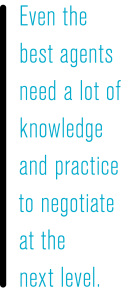By Dale Carlson, CRS
One of the most overlooked aspects of a real estate transaction is one that often has the biggest impact on the success of the transaction: proper negotiations. Real estate education and sales focus primarily on marketing, ethics and risk reduction, but how to negotiate is often overlooked. Negotiation is a skill; even the best agents need a lot of knowledge and practice to negotiate at the next level.
The focus of the Next-Level Negotiations course goes beyond the Win-Win Negotiations course that RRC currently offers. It is designed to focus on agents at any level, and takes a professional and ethical approach to helping any client make the best negotiation decisions during a real estate transaction. Each attendee of the course will leave with a negotiation plan (similar to a marketing plan) that they may adapt to each individual client, opposing party and transaction type.
Negotiation tactics
Although the end result of a real estate transaction may be for all parties to feel they had a winning experience, an agent usually has a fiduciary duty to represent one party to the transaction. Therefore, it’s important for an agent to understand what issues to identify as negotiation points and be aware of how others might use negotiation tactics in opposition. To accomplish this, an agent must understand a variety of negotiation tactics, the psychological impact of certain actions and how to respond to any negotiation in a way that maximizes the opportunity for a positive outcome for their client.
 A highly interesting part of the course includes psychological tactics used in negotiations. It is important to recognize the influences not only to be a better negotiator, but also to protect one’s client from those influences being used against them. There are emotional influences such as mimicking, schmoozing and yielding a “win” on a minor point that grant one a slight upper hand. There are power influences, such as sitting a little higher than the opposition, positioning, showing anger or frustration, and conducting business face to face vs. via email or phone. There are also collaborative influences, external influences and other categories that require practice so you know the best way to apply them or to deflect them when they are deployed against you.
A highly interesting part of the course includes psychological tactics used in negotiations. It is important to recognize the influences not only to be a better negotiator, but also to protect one’s client from those influences being used against them. There are emotional influences such as mimicking, schmoozing and yielding a “win” on a minor point that grant one a slight upper hand. There are power influences, such as sitting a little higher than the opposition, positioning, showing anger or frustration, and conducting business face to face vs. via email or phone. There are also collaborative influences, external influences and other categories that require practice so you know the best way to apply them or to deflect them when they are deployed against you.
Negotiation styles
The entire course builds on existing knowledge and skills, and focuses on outcomes that are immediately applicable to an active real estate agent. By learning to differentiate negotiation styles, such as data-driven vs. relationship-driven vs. control-driven styles, an agent can establish a plan and script to effectively handle the next encounter. Any agent who feels they are a great negotiator or wants to improve can take something away from the course. Who couldn’t benefit from enhancing skills, developing a working negotiation plan or cracking the code on different styles of negotiations?
Dale Carlton’s new class on negotiations is called Next Level Negotiations. For more information, visit CRS.com and click on Education.
Photo: iStock.com/ilyaliren








